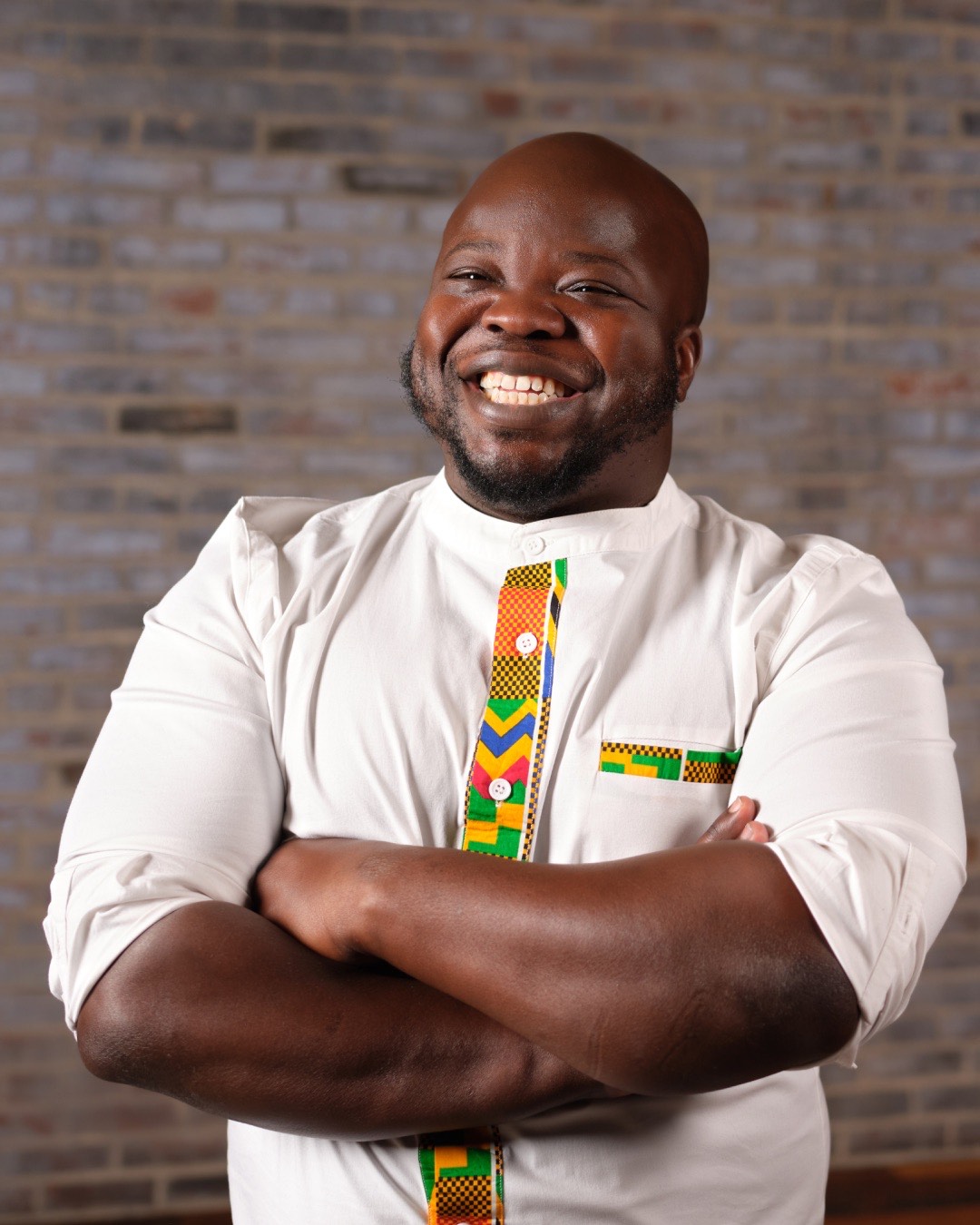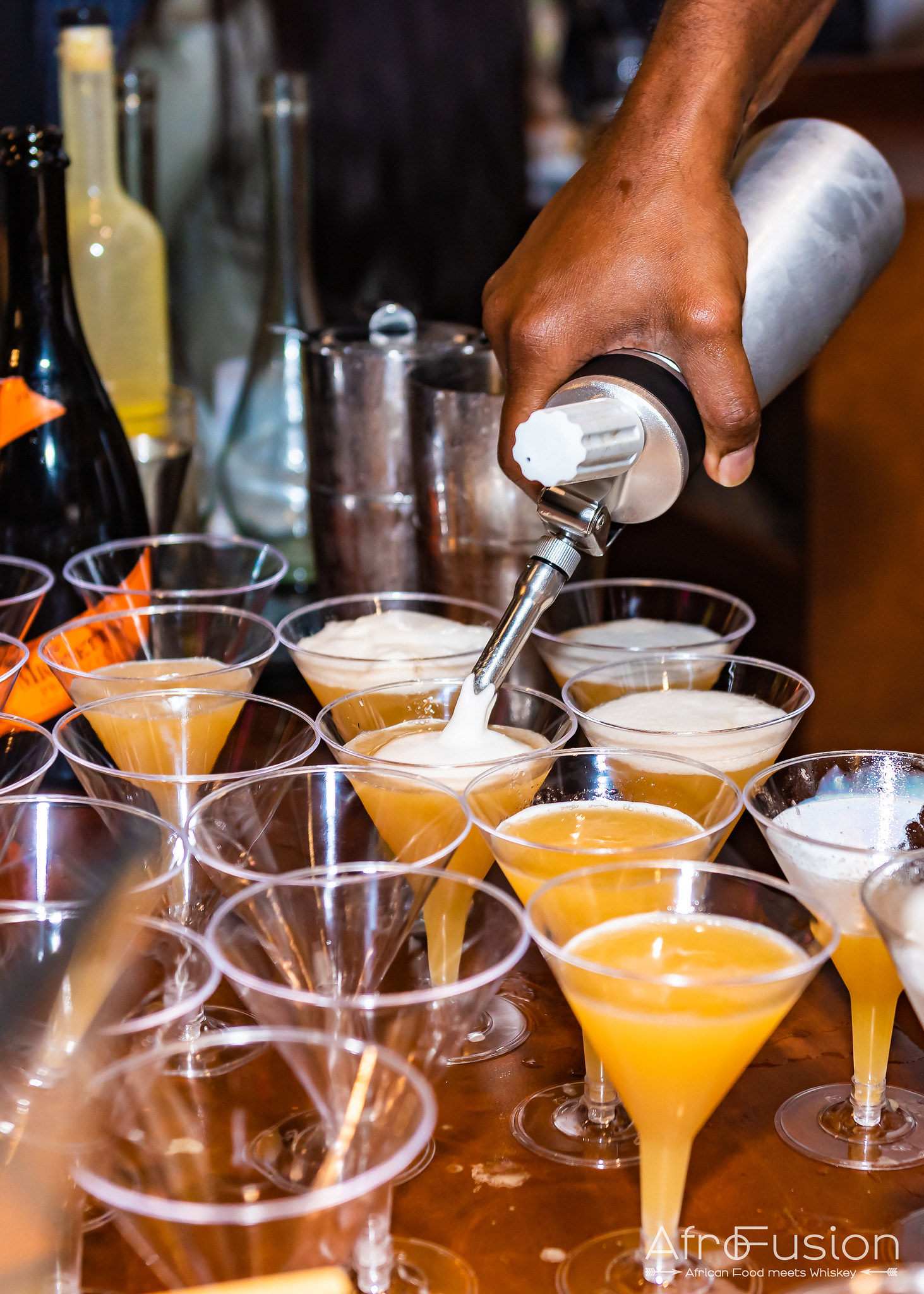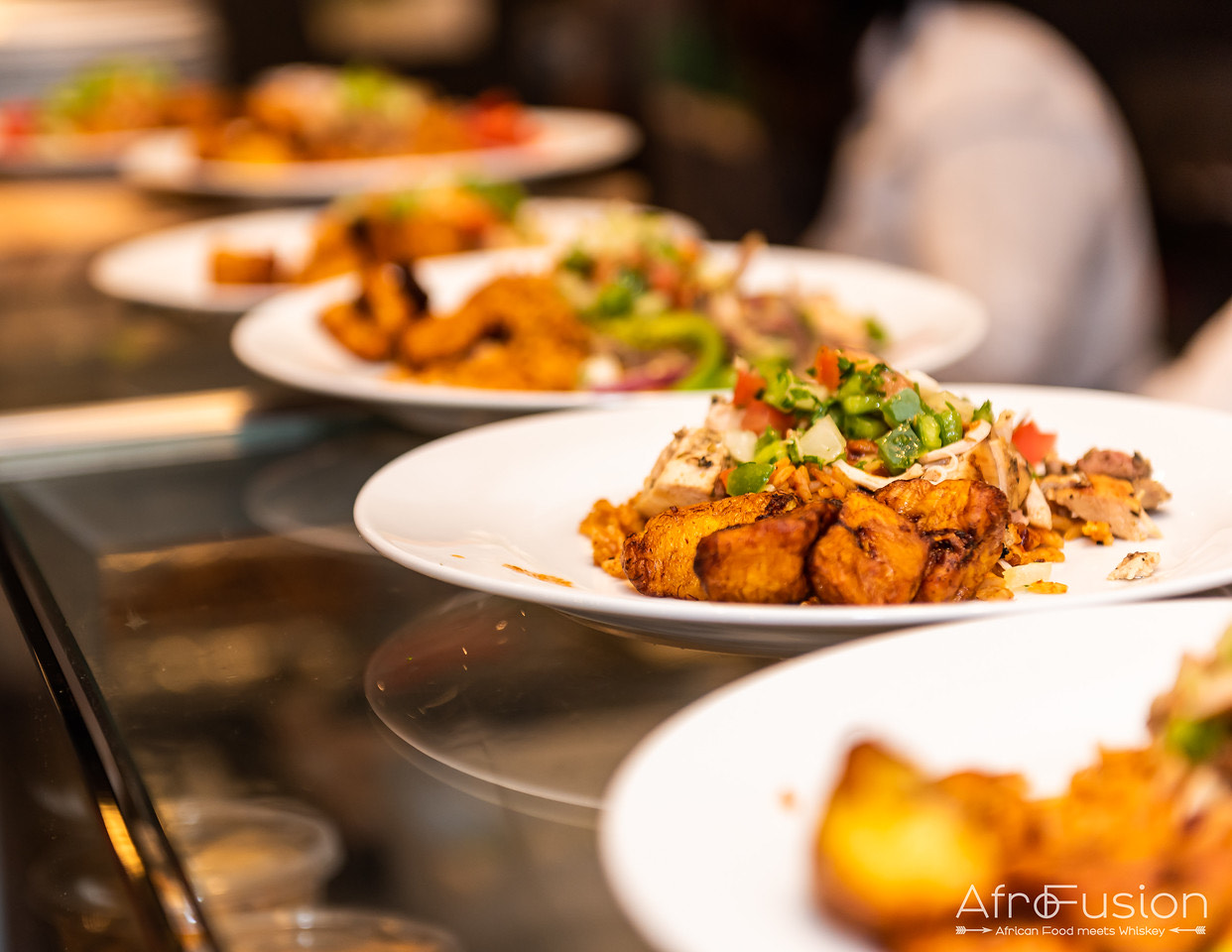Jack Beguedou might be doing the impossible in bourbon whiskey — bringing something completely new to the table. Beguedou, a Togolese immigrant, has been deeply devoted to all things whiskey for years. But it was only recently that he started taking that knowledge to the masses, via his whiskey influencer handle, Hood Sommelier. Now, Beguedou is picking barrels to release under his brand, and leading much-sought-after tastings blending West African cuisine with fine Kentucky bourbon.
Where did it all start? From not seeing himself or his West African immigrant friends and family represented in the bourbon and wider whiskey world. Beguedou has made it his mission to change that, via whiskey reviews online (in various formats) and bringing two disparate communities together, through their mutual love of good whiskey and good food.
We caught up with Beguedou recently, to talk about his new partnership with Heaven Hill, and his AFROFUSION concept, where West African chefs, DJs, and bartenders host parties, brunches, and tastings for anyone looking for something truly special in the whiskey game. We also talked about how a French-speaking kid from Togo got into whiskey in the first place and how our culture informs what we experience in every drop of whiskey. It was a fun and illuminating conversation.
Also Read: The Top 5 UPROXX Bourbon Posts Of The Last Six Months
- The Single Best Bottle Of Whiskey From Each Of The 50 States
- The 50 Best Bourbon Whiskeys Of 2021, Ranked
- Every Winning Bourbon From Our 2021 Taste Tests, Blind Tasted And Re-Ranked
- The Best Value-Per-Dollar Bourbon Whiskeys, Ranked
- The 100 Best Whiskeys Our Head Drinks Writer Tasted In 2021

Give us a little bit of background of how you first got into whiskey.
I got into whiskey truly as a fluke. I got into insurance about 12 years ago. It all started with me drinking Johnnie Walker and some bourbons with my mentor when he was teaching me how to golf. As my mentor, he was teaching me the ways of doing business, which means golfing, knowing good spirits, and having good conversations. And truly, it just became something that I was obsessed with. It started actually with him breaking things in my head — because I’m from a French-speaking country. I’m from West Africa. We’re drinking a lot of single malt. I’m like, “Johnnie Walker Red and Black. Black is the top one.”
He was laughing that day because he’s someone who was much older than me. One day, he was like, “I know you say you know good things, but whatever you know, there is always something above it.”
So he goes, “I heard you last time, all talking about how you know so much about malt whisky, and you said, ‘Johnnie Walker Black.'” He said, “What about the Johnnie Walker Green?” My eyes just widened. “What about the Blue?” I was like, “What is this guy talking about? Those things don’t exist. He’s making up colors for them, right?!”
Mind you, I was 25 at that time, so that’s 12 years ago. A week later, we go to this nice golf course. It’s a big tournament, a lot of big wigs there. And my mentor orders, “Johnny Walker Green, please.” Then they pour that. I take a sip and I look at him like, “whoa…” I had a pour of it. I’m like, “You know what? Moving forward, I’m going to do research. I’m going to know everything.”
Then how did that expand into you doing bottlings and having this huge impact on the game?
About five years later, I was obsessed because I was terrible at golf, but I was good at bringing good whiskey on the course. It became my thing. Today, I have a strong immigrant community and client base here in the Midwest. Every time we do an event, I’m bringing whiskey. If someone is getting married in our community, they’re calling me about which whiskey to bring.
Myself, I started buying more and more. Every time I have any business gathering, I’ll be the whiskey guy. But it was just when it came to parties or when it came to business. That was it. So I’m getting into more whiskey, but I’m just buying it based on somebody’s YouTube research, right?!
I know that well.
So, about five years ago, I started going, “Okay, wait a minute. Why am I buying all this crap? Why am I having all these things? What’s the point?” It was more of, now I need to really dig into it, catalog it, know exactly where I’m standing. This is when I got into bourbon because single malt is what I had all around. Boy, that was a whole different world to jump in. Now, it was only my American friends who like it because all my immigrant friends only like single malt. So now I have two audiences. And then about four years ago, that’s when I learned something important. My best friend — who actually designed my Hood Sommelier logo — he’s like, “Dude, I was looking for this drink. I went online, and no one looks like us. Is there no black person or no immigrant who talks about whiskey?”
So, when he said that, I’m like, “Bullshit.” In my mind, I’m like, “That doesn’t make sense. Bullshit.”
There really wasn’t back then, was there?
Right? I’m like, “No. That doesn’t make sense.” He’s like, “No. I’m telling you. All these things you do for us, you do all this and teach people about drinking and all that …” He’s like, “There’s no one who does that like us. Why don’t you do that?”

So how did you start?
I was like, “Editing videos, doing all this thing, I can’t … That’s just too much.” I didn’t have the confidence then, but then I started. I spent probably a year online just watching people like Whiskey Tribe, and all these people, watching all these people talk about the whiskeys. I’m like, “I can do that. That’s what I do every day. I can do that.”
One of the decisions I made at that time is I wanted to move from the West Side of Omaha, the rich side, to actually move to North Omaha, which is considered an economically depressed and struggling neighborhood with my people living in it. That’s the “hood.” Being in business, I’ve started getting into boards and talking about problems that affect the Black communities in our town. Somebody at one of those meetings said to me, “How are you guys sitting here talking about issues that concern us, but you don’t live in the neighborhood? You are not part of things that are happening.” So I moved into the neighborhood. I decided it was more important to be in the life with the people than outside of it looking in. That’s how change is made.
At that same time, I realized that I probably have one of the biggest libraries of whiskey in the Midwest. I talk to a lot of people in the industry and have close to 5,000 bottles. So I’m like, “I want to be that guy in the whiskey industry. That’s who I want to be. I want to be the guy who is building a community of people, regardless of their background.”
Wow. That’s impressive. Now, you’re working all over the industry. You just started working with Heaven Hill with AFROFUSION and are bringing West African vibes to Kentucky bourbon.
It’s, again, something that defines me. I am a guy who grew up in Africa, ate African food. If you look at AFROFUSION, I want AFROFUSION to become a global thing. It’s where whiskey meets flavors that they might not probably meet in the same house. I’m African, I eat African food, but usually, I have it with bourbon, or I have it with single malt. Where do those two meet?
Really, the basis of AFROFUSION was not about the food or the bourbon. It was about unity. We went through a tough time where … It got to the point it was weird for a white man from a small town to be in the same room as a black person from Africa because of the social differences and political opinions that we have. So, I asked, “How do we create an event that creates unity?” Look, West African food is very foreign to a guy who drinks whiskey somewhere in Kentucky. Plus, bourbon is not actually something a lot of African people drink because they usually drink single malt, right? To bring those two people together in the same room with that one thing that’s familiar to each of them and create this blending event is what I wanted to do.
That’s the concept of AFROFUSION. African food, meet whiskey. I know why I didn’t say bourbon, why I didn’t say single malt. I say whiskey because it can be any whiskey: rye, bourbon, single malt, whatever.

Let’s look at tastings for a moment. You’re from Togo and I’m from the Pacific Northwest. Growing up, I’m eating a very specific diet that’s regional. Likewise, you’re growing up eating specific foods that I’m likely not. Yet, we can both come together over a glass of whiskey and find different things. When you’re leading tastings, how do you approach the fact that who we are and where we come from affects what we’re actually going to taste ad smell in that whiskey?
That’s one of those things that I tell people all the time. I’m sure you know this, but when I do any private tasting, I actually have a Scotch school where I teach people about Scotch whisky. Funny thing is, when we start tasting, I tell people that I’m not going to say anything ’til we’re done getting everybody’s tasting notes. People always think it’s weird. I’m like, “No. I’m not here to tell you because the brain is a sensitive machine.”
Yes, it is.
If you put something in somebody’s head enough, they will believe it. People are like, “Oh, okay, sure…” I start every tasting, “Anything we do say, there’s no wrong answer.” Once you say, “There’s no wrong answer,” people come up with stuff that will blow your mind because of our different backgrounds.
I like to say, “Our brain has a catalog of taste notes based on our life experiences.” That’s literally what it is. Our brain has a registry or a catalog of notes already preset that’s based on experiences. If you traveled a lot, you will have more to say about a spirit. If you stay sedentary, there will be less you say about that same spirit. I see it in my tastings, the more traveled or exposed to different cultures someone is, the deeper of flavors and layers they will find in a spirit. Always.
That always translates to the glass. It’s all there but you’re the one pulling it out, right?
Exactly, I grew up eating a lot of seafood. So when I’m talking to people about flavors, I might use a word like star anise. Or I say cloves. Or I’m saying, “Oh, there is a ghost pepper.” I talk about ginger. I talk about this plant back home that they call the “old ladies playing football,” which is a plant that is supposed to resurrect you. Those things are all things that when you tell an African, they’re like, “Oh yeah. I know what you’re talking about.” But if you tell that to someone else, they’d be like, “I don’t get it.”
But in the meantime, I didn’t grow up around strawberries. I didn’t grow up around pears. But I grew up around mango. I grew up around papaya. I grew up around real sugar cane. So when I’m doing a rum tasting, I’m telling them about sitting on the summer days on top of the roof of your house and eating raw sugar cane and breaking it down. Unless you grew up in that environment, you would not get it.
I wholeheartedly agree. I grew up next to a temperate rainforest full of mossy cedar trees and wild mushrooms and wild berries and smoked salmon and oysters and stuff like that. So I’ll latch onto earthy, mossy, umami, mushroom notes, and oyster liquor or smoked salmon bellies. Other people just look at me like I’m crazy sometimes with those notes. I’m like, “Oh. You’re from the desert or grasslands or somewhere else where those notes mean nothing to you…” But it doesn’t mean that anyone’s wrong. I think that’s what’s important, and why I love what you’re doing.
So tell me, what’s next for AFROFUSION?
The goal for next year is to see how to develop AFROFUSION to be a phenomenon that we can take all around the United States, exposing people to West African food, partner with African chefs all around the United States, and hopefully work with a brand that can take it global, so we can actually do this more internationally. Hopefully, there are a couple of events that we’re working on right now that will have to do with more food with a New Orleans-style approach, exposing people to the Afro-French culture and style. Obviously, nothing happens without great music. Afrobeat is taking over the world, so I always keep a good DJ who does Afrobeat.
One of the things I want to do is if I invite you to my house in Africa, I want you to feel great and welcome. That’s what AFROFUSION is going to be. Bring people together from Kentucky to West Africa … Fusion. I want people to feel free in that environment and feel as if I transported them, for just a moment, back to where I grew up.
https://www.instagram.com/p/Cah1EFWr5cs/







